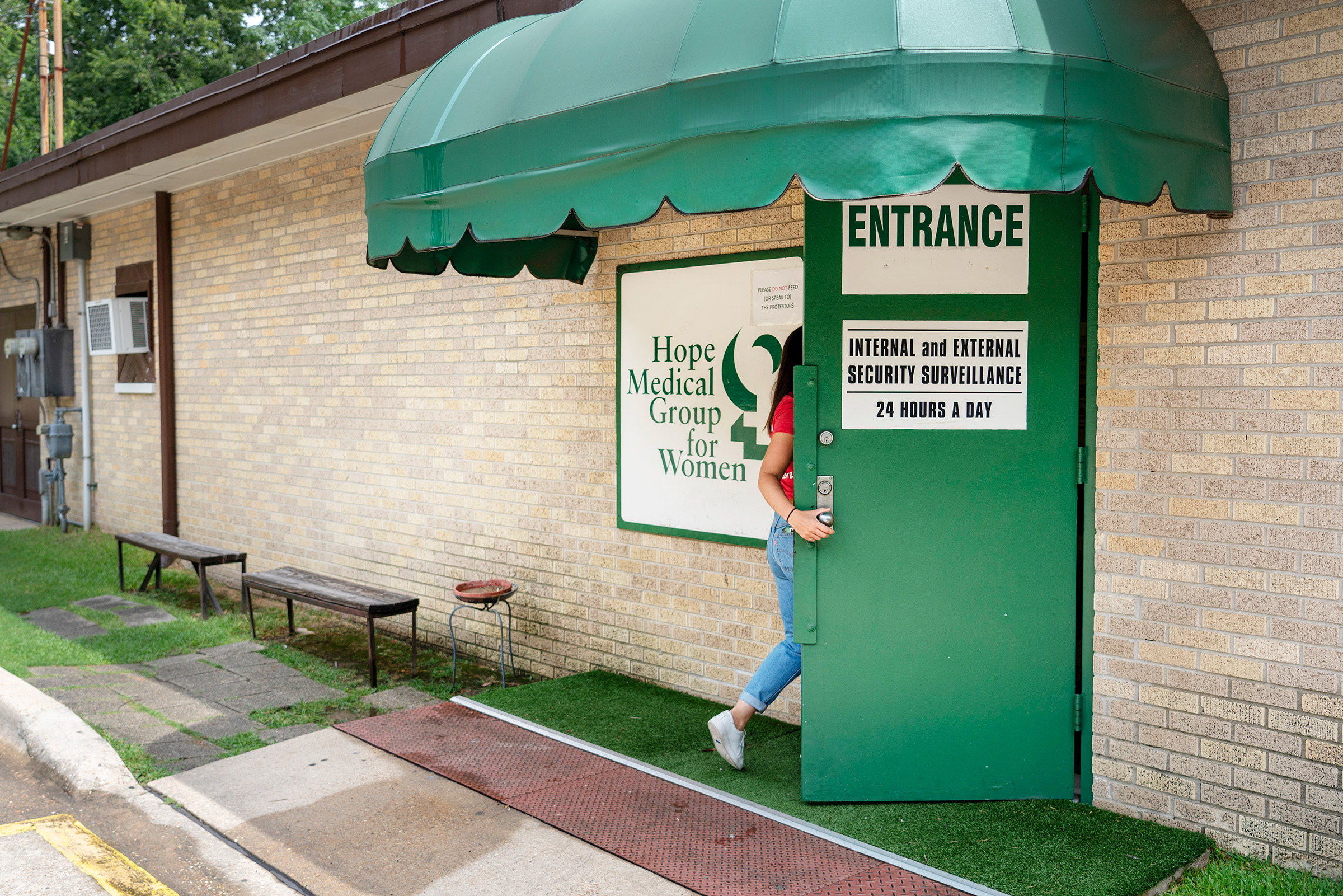
Kathaleen Pittman likes to leave the door of her office at Hope Medical Group for Women open at the end of the day. That way she can watch patients leave after their abortions, and absorb the palpable sense of relief in the clinic’s hallways. “Being able to see them before the procedure, after the procedure, and just have them say how grateful they are that they were able to make it in when they did, that just can make all the difference in the world,” Pittman says. “Aside from the craziness, I absolutely still love this work.”
Pittman, who has been at Hope since 1992 and is now the clinic’s administrator, may not be able to do that work much longer. Located in a squat, unassuming building in Shreveport, Louisiana, Hope is one of three abortion clinics left in the state. It’s locked in a legal battle with the state and anti-abortion groups that has launched both sides into a national fight over women’s rights to an abortion. On March 4, the Supreme Court will hear arguments in June Medical Services v. Russo, in which Hope is a plaintiff. It’s the first major abortion case before the nation’s highest court since President Donald Trump’s two justices, Neil Gorsuch and Brett Kavanaugh, joined the bench. The court’s decision could impact how safely women can access abortion in the U.S.
At issue are two legal questions: the validity of a Louisiana law that requires abortion doctors to have admitting privileges at nearby hospitals, and, more broadly, whether abortion providers like Hope have the right to go to court over laws like this one that restrict their services. If the Louisiana law is allowed to stand, Hope might have to close its doors because only one doctor working there would be able to practice, impacting thousands of women who pass by Pittman’s door every year.
The second question could have even wider implications. Stemming largely from a 1976 Supreme Court decision, abortion providers have been allowed to sue on behalf of their patients. But Louisiana’s Solicitor General Liz Murrill wants to change that and has asked the Supreme Court to rule that only women seeking abortions can sue, since they are ultimately the ones affected by laws regulating access to abortions. If the court rules in favor of the state, it would make it much more difficult to challenge restrictive abortion laws nationwide.
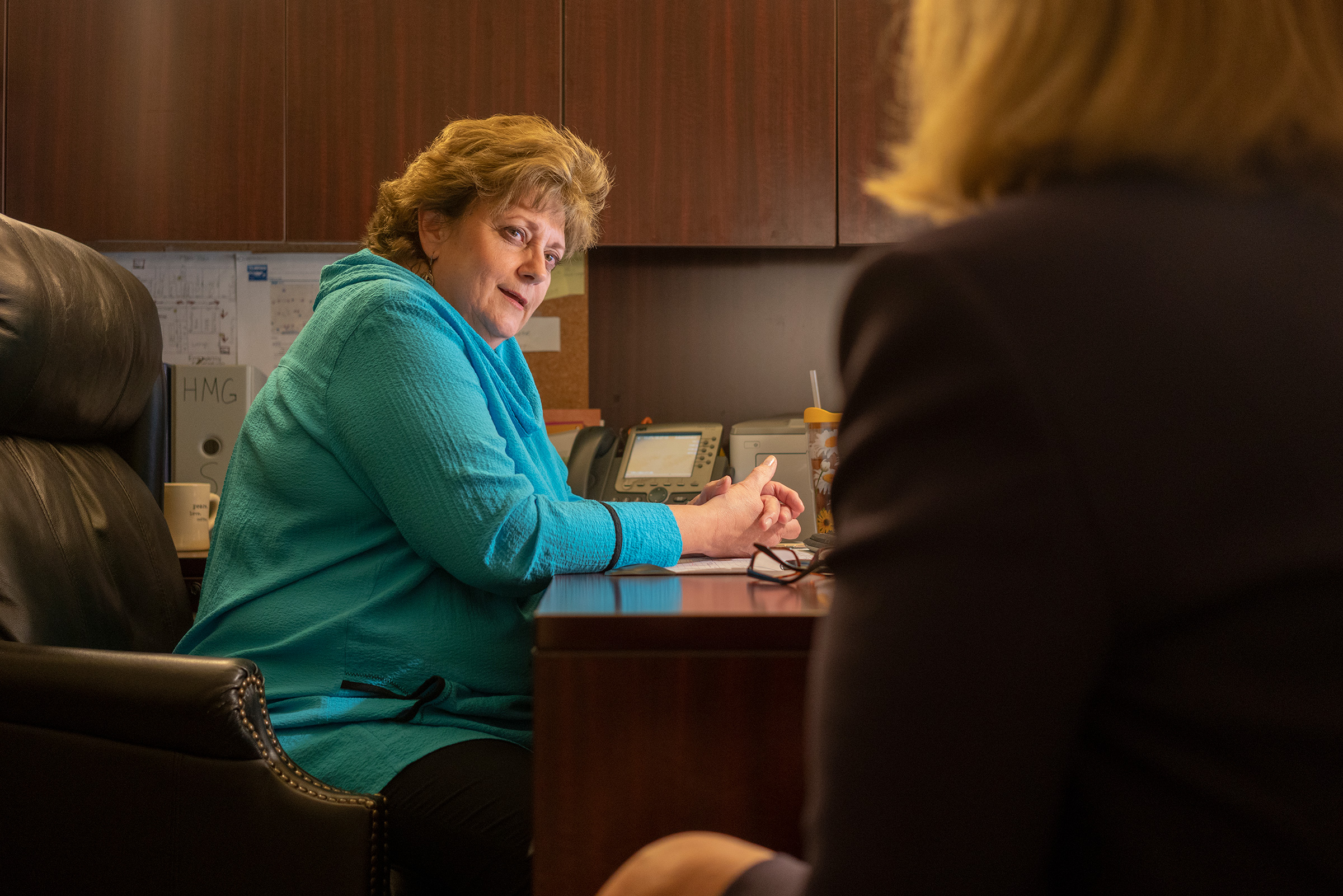
Bringing these questions before the Supreme Court is part of a broader pattern of conservatives’ efforts to roll back abortion access in the U.S. How the court rules will have significant effects on laws and litigation underway in several states, including potentially halting numerous challenges to existing laws that restrict abortion access. The decision in this case and the fate of Hope Medical Group for Women is expected to be a bellwether for the future of women’s right to choose in a judiciary that Trump has filled with conservative judges.
“The stakes are extraordinarily high,” says Nancy Northup, president and CEO of the Center for Reproductive Rights, which is representing the Hope clinic in the case. “What we have seen is an almost 50-year campaign to deprive in practice what the promise was of Roe v. Wade.”
Over the years working at Hope, Pittman has seen plenty of animosity directed at her and her colleagues by anti-abortion activists. She’s watched a makeshift Molotov cocktail that was lobbed at the building fizzle out on the sidewalk. She’s been evacuated with all other staff and patients when a suspicious backpack was left unattended in the yard. She says she’s heard about acid injected into the facility through a hole in the door. “We always have to be careful and watchful,” she says. “At the same time, we can’t allow that to deter us.”
That kind of protest has increased in recent years, she says, as the number of clinics has dwindled. Louisiana already has several barriers to abortion access in place, including banning abortion after 22 weeks, requiring in-person counseling before the procedure, and limiting insurance coverage. Those restrictions helped bring the number of clinics in the state down from seven in 2011 to three today, according to the Center for Reproductive Rights. The three clinics left performed over 8,000 abortions last year. Most patients are from Louisiana, says Pittman, but about a third come from states where it is also difficult to obtain an abortion like Arkansas, Texas, Mississippi, Oklahoma, and as far away as Nebraska.
In 2014, Louisiana passed the “Louisiana Unsafe Abortion Protection Act,” which said doctors performing abortions in the state must have active admitting privileges at a hospital within 30 miles of the abortion facility. The Center for Reproductive Rights challenged it shortly after, and in 2017, a district court struck down the law. But the state appealed, and the following year, the Fifth Circuit reversed the district court’s decision. The Center for Reproductive Rights petitioned the Supreme Court, and in 2019, the nation’s highest court agreed to hear the case, after the Louisiana Solicitor General’s office had also asked the Supreme Court to also rule on the standing question if it were to take the case.
Critics of the law say it is little more than a pretext to close abortion clinics. According to Pittman and others fighting against Louisiana’s law, admitting privileges don’t actually safeguard women. They say that abortions are overwhelmingly safe, and some research backs that up. According to data cited in the district court’s 2017 decision, just 0.05% of outpatient abortion procedures performed in the first trimester involve major complications that require hospitalization. The decision also notes that over the last 23 years, Hope, which typically serves more than 3,000 patients per year, has only had four patients who required hospital transfer.
Admitting privileges are also notoriously difficult to obtain, opponents say—and are more a product of a business relationship between a hospital and a physician than a health-and-safety measure. Only one doctor at Hope has admitting privileges at a local hospital because he has a full-time hospital job delivering babies in addition to his work at the clinic. He has said he will stop performing abortions if the Supreme Court upholds the law, due to personal safety concerns if he became one of — if not the only — doctor in the entire state of Louisiana who could provide abortions. “Truthfully, one physician cannot handle the need, even if he were to work constantly,” says Pittman. She has been trying to get her other physicians admitting privileges since 2014, when the law was passed, but to no avail.
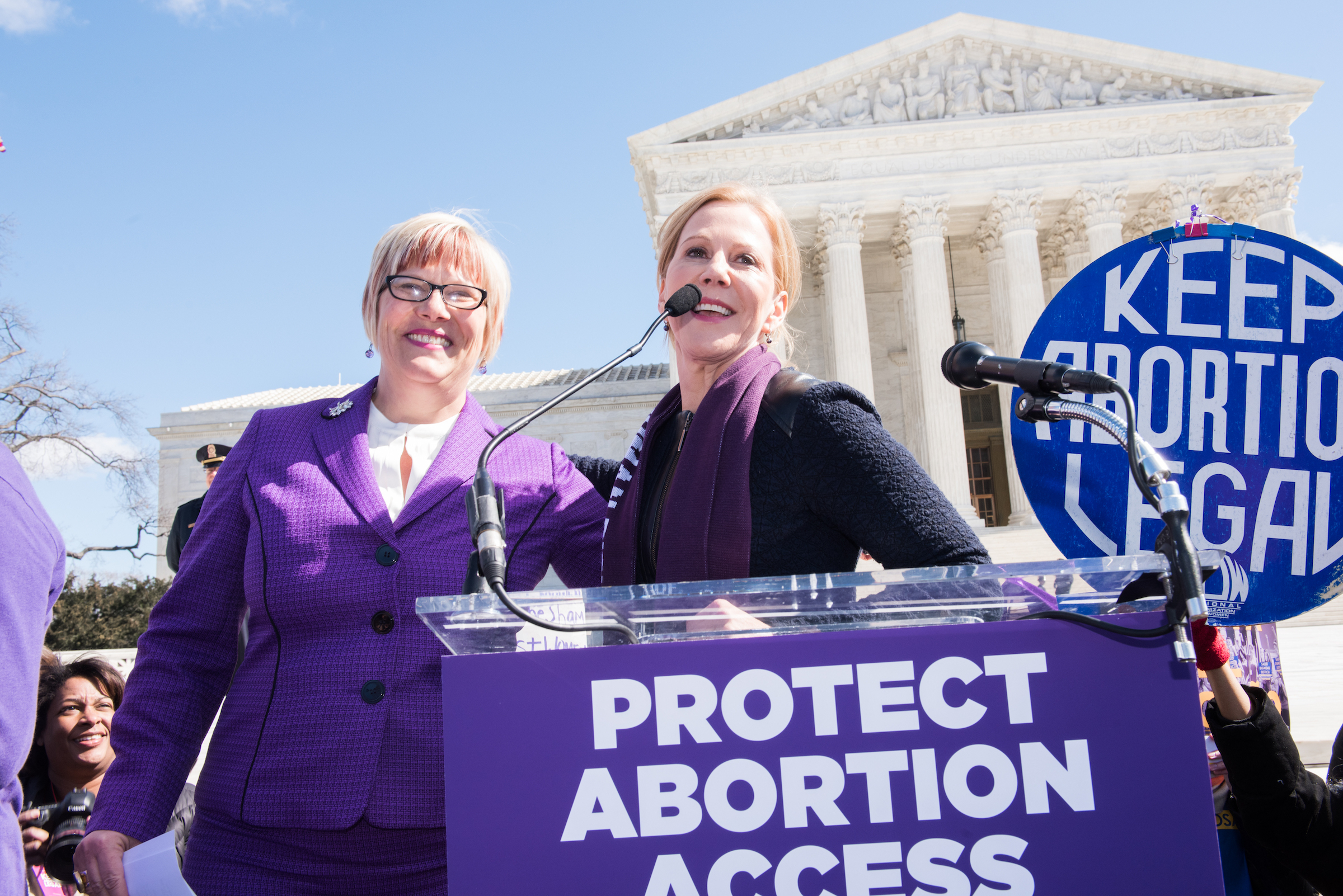
When “abortion is so safe that you almost never send a patient to a hospital, the hospitals have no financial incentive to give that doctor admitting privileges,” says Travis J. Tu, senior counsel at the Center for Reproductive Rights and a litigator in the June Medical Services case. “And in a state like Louisiana, where hostility towards abortion and abortion providers is rampant, hospitals actually have many disincentives to create a financial admitting privileges relationship.”
Less than five years ago, the Supreme Court agreed. In the 2016 case Whole Woman’s Health v. Hellerstedt, the court ruled 5-3 that a law in Texas that required providers to have admitting privileges and hospital-grade facilities violated the Constitution by placing “a substantial obstacle in the path of women seeking a pre-viability abortion” and “constitutes an undue burden on abortion access.” At the time, the late Justice Antonin Scalia’s seat sat vacant, and former Justice Anthony Kennedy sided with the court’s four liberal justices.
The Louisiana case faces a very different court, with two new justices on the bench nominated by President Trump. Scalia’s seat is now filled by Gorsuch, and Kavanaugh has replaced Kennedy. With Kavanaugh more reliably conservative than perennial swing vote Kennedy, the Supreme Court now has a solid 5-4 conservative majority to consider this case. Interested parties on both sides of the issue are wrestling with whether the court’s traditional respect for precedent will prevail, leading the court to stand by the Whole Woman’s Health decision, or whether the votes of the two new justices might lead to a different outcome.
“I don’t think it’s fair to think of the court in such political terms, like now that there’s two more [conservative justices], for sure, everything is going to be overturned,” says Andrea Picciotti-Bayer, lead attorney at The Catholic Association, which opposes abortion. But, she adds: “Sometimes mistakes happen. And the history of the Supreme Court is full of cases where reasoning and holding has been readjusted in light of a new understanding.”
In New Orleans, more than 300 miles away from the Hope clinic, Benjamin Clapper is hoping for exactly that sort of moment. As executive director of Louisiana Right to Life, Clapper brought the idea of the admitting privileges law to the Louisiana legislature in 2014, and has been supporting it through court challenges for the past five and a half years.
Like Pittman, Clapper considers this to be his life’s work. Now 35, he been working on anti-abortion causes since he was in high school. He says he initially felt motivated by a calling to protect the unborn. But the longer he’s been doing this job, and the more stories he’s heard from women who have considered or had abortions— women, he says, who were shaken, regretful, or scared— the more he has felt that restricting abortions is about supporting women, too. “While I began with the perspective of wanting to defend the rights of the unborn child, I’ve been able to see that the abortion facilities, in their pursuit to sell abortions, kind of lose sight of the care for the woman in that process,” he says. “That was part of the motivating factor behind this law.”
In 2014, after hearing about Texas’s law and other states who had considered enforcing admitting privileges at abortion facilities, Clapper brought his idea to then-state Rep. Katrina Jackson. (Jackson, a Democrat, is now a state senator.) In the initial meeting, Clapper says he presented Jackson with evidence for why Louisiana needed a law to mandate admitting privileges, including testimony from women about substandard levels of care they had received at abortion clinics and documents he had compiled outlining a series of health violations the Louisiana Department of Health had found at abortion facilities in Louisiana, including Hope.
He and others believe those infractions—which at Hope ranged from failure to properly clean and disinfect medical instruments in 2012 to failure to ensure a physician completed and documented medical examinations of each patient in 2010—might help Louisiana’s law meet a different fate at the Supreme Court than Texas’s. (“When deficiencies are cited they are corrected,” Pittman says in response to the violations recorded at Hope. “No one is more invested in the care and safety of our patients than our physicians and staff.”) Clapper also pointed out to Jackson that abortion facilities are the only outpatient surgical facilities in the state that did not have to have admitting privileges at a local hospital.
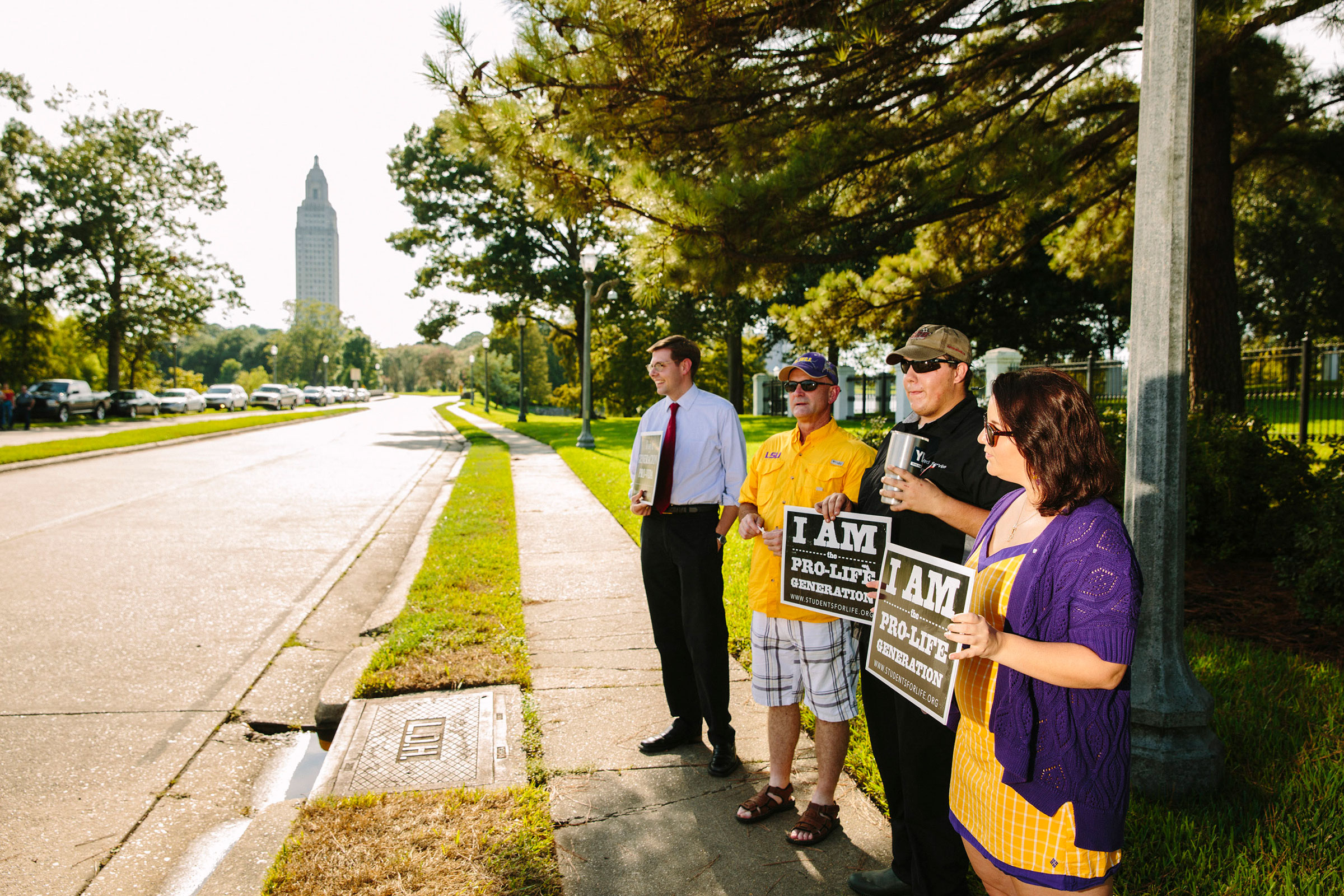
In the end, it was a successful pitch. Jackson ended up introducing the legislation, which passed with a bipartisan majority in 2014. It has been tied up in court battles ever since. “As a woman, I said that there was no way that there should be a lower standard of healthcare only in the area of abortion,” Jackson tells TIME.
Proponents of the law say it isn’t a pretext to close clinics, as critics claim, but is rather aimed at ensuring that the quality of abortion clinics is prioritized over the quantity. They say it brings abortion clinics in line with the standards at other similar medical centers and guarantees a high standard of care for women and a smoother way to get them to the hospital if something goes wrong. It “ensures some level of competency on behalf of the doctor,” says Maureen Ferguson, a senior fellow at The Catholic Association.
Public opinion in Louisiana supports those on the anti-abortion side of the issue: 57% of adults in Louisiana believe abortion should be illegal in all or most cases, according to the Pew Research Center, a stark departure from the 61% of Americans overall who believe abortion should be legal in all or most cases.
“So many people look at this as just a political issue,” says Angie Thomas, who works with Clapper as the associate director of Louisiana Right to Life. “But when you humanize it, when you see that abortion is not good for women, it becomes so much more significant to understand the stories and to understand the plight of women in unplanned pregnancies and the lack of support that they’re getting.”
The biggest impact of this case may not simply be whether Hope and the other two abortion clinics in Louisiana get shuttered. How the Supreme Court rules on whether or not clinics have standing to sue in court on behalf of their patients could have much wider consequences for the future of abortion laws throughout the country.
Those who say clinics should not be able to pursue legal cases on behalf of women argue that abortion providers have their own business interests at stake and, as the ones who charge money for providing abortions, cannot be counted on to represent the best interests of their patients. “This is like a fox guarding the hen-house situation,” says Mallory Quigley, vice president of communications at Susan B. Anthony List, an organization dedicated to ending abortion.
But in order for an individual to sue, abortion-rights advocates worry she would need to bring the lawsuit while she is still pregnant to meet the legal test for standing. They point out that is an extremely narrow window of time, at a moment when a woman is making deeply personal decisions about terminating an unwanted pregnancy. Clinics, they argue, are better placed to take the fight to court. “The way these laws work, they’re steps removed from the patient’s actual purview,” says Tu of the Center for Reproductive Rights. “They work their harm directly on the physicians. So the people who know best—who are on the front line, seeing the actual effect of the law is causing the reduction in abortion access — are the physician and the clinic.”
The standing question allows for a few scenarios in the Supreme Court’s judgment, which isn’t expected until this summer. The justices could rule that abortion clinics do not have standing to sue on behalf of patients, which would have major ramifications for abortion litigation and allow them to avoid ruling on whether or not Louisiana’s law is unconstitutional. Or, the justices could keep the status quo on standing, allowing clinics to sue and not rocking the boat on the overall pattern of abortion litigation, and then render a decision on Louisiana’s law.
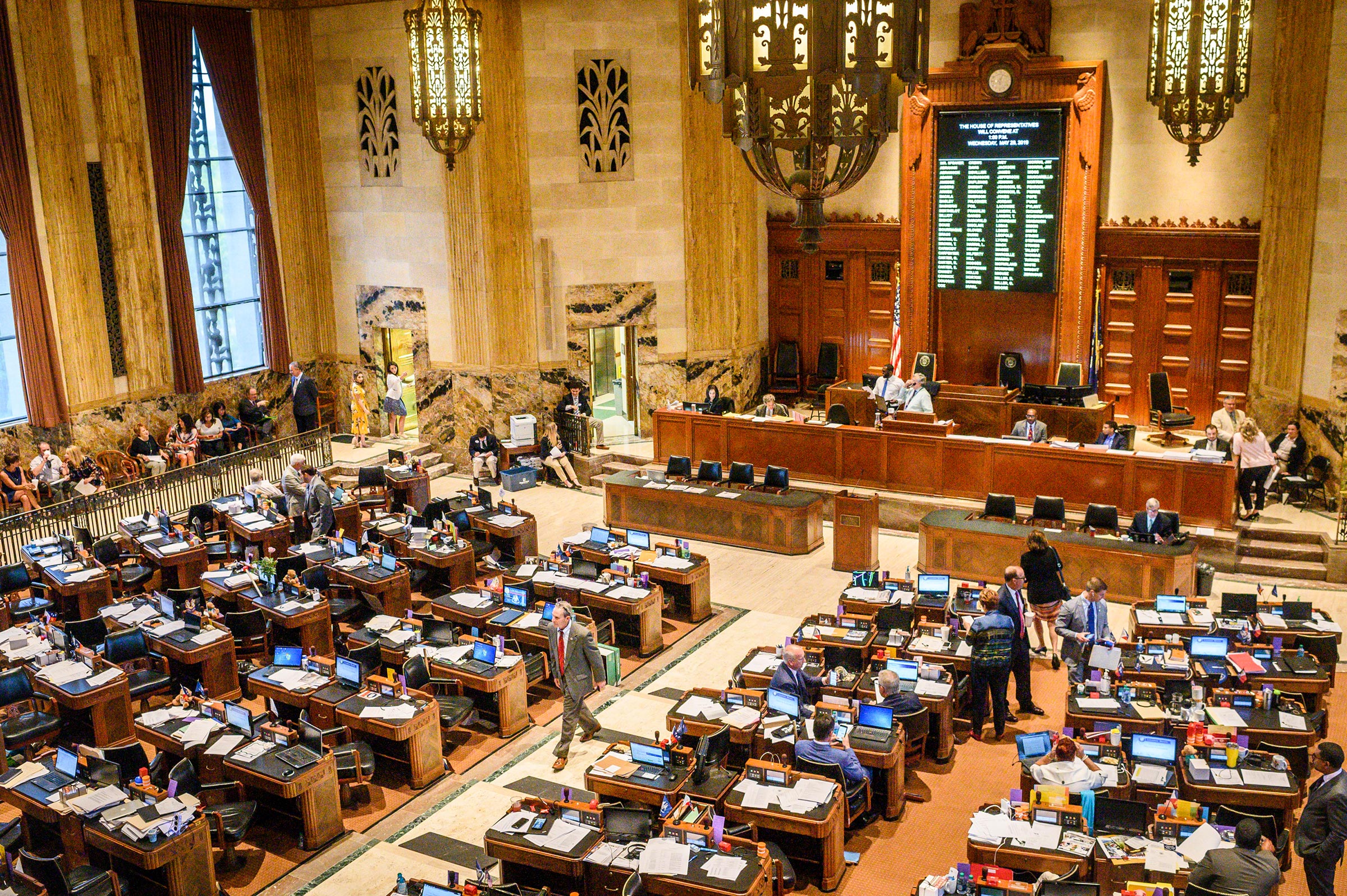
Bringing the standing question before the Supreme Court is just one new tactic in a series of legal maneuvers aimed at restricting abortion throughout the country. There has been an escalation in anti-abortion legislation since Republican lawmakers took power in many state legislatures in 2010; according to the Center for Reproductive Rights, nearly 450 state laws restricting abortion access have passed since 2011.
Some of the new laws have been aggressive assaults on Roe v. Wade itself. In one of the most extreme examples, Alabama passed a law in 2019 outlawing abortion in almost all cases, with no exceptions for rape or incest, and introduced a criminal penalty for doctors who perform abortions. Others have restricted access by banning abortion after a certain time period, or for certain reasons, or by instituting mandatory waiting periods on women seeking abortions. There’s also a new wave of measures called “pain capable” bills working through state legislatures in tune with an idea that has failed to pass federally. They ban abortion after 20 weeks, based on the premise that a fetus can feel pain after that time.
Many of these laws are being fought in court right now, and what the Supreme Court decides about standing could determine if those challenges also can move forward. “I think you’re going to see a lot of those cases be removed altogether,” predicts Thomas of Louisiana Right to Life.
Abortion-rights advocates would see that as a major step backwards. “I’m frustrated and angry that we are in the position that we’re in today having to re-fight battles,” says Northup of the Center for Reproductive Rights, “whether (it’s) a battle from four years ago at the Supreme Court, or the ultimate battle from 47 years ago in Roe v. Wade.”
For now in Louisiana, Clapper and Pittman will each continue working towards their opposite missions, waiting for the panel of nine judges in the nation’s capital to decide who wins. After hearing oral arguments on March 4, the Supreme Court isn’t likely to render a decision in this case until June.
Until then, Clapper will continue speaking to Louisiana women and to the media, trying to educate the public about what he sees as the untold human cost of this issue that’s so often framed around politics. “So many women who have been hurt by abortion, as you can imagine, are hesitant to share that story, because it’s of course extremely personal,” Clapper says. “But for those women who feel like they want the world to hear their stories, we have a responsibility to make sure their stories are heard.”
And up in Shreveport, Pittman will continue to churn through the daily slog of attendant paperwork involved in running a busy abortion clinic, punctuating her days with as many visits with patients as she can.
Sometimes at work she thinks about her mother, a Catholic who later became a Southern Baptist and who had sixteen children. When Pittman first started at the Hope clinic decades ago, she was too nervous to admit to her mom that she was counseling women about abortions. But one day, she decided she needed to come clean, unsure of how her mother would react.
“She got this funny expression on her face,” Pittman recalls. “She said, ‘Darling, women have always had abortions, and they always will. They need a safe place.’”
More Must-Reads from TIME
- Donald Trump Is TIME's 2024 Person of the Year
- TIME’s Top 10 Photos of 2024
- Why Gen Z Is Drinking Less
- The Best Movies About Cooking
- Why Is Anxiety Worse at Night?
- A Head-to-Toe Guide to Treating Dry Skin
- Why Street Cats Are Taking Over Urban Neighborhoods
- Column: Jimmy Carter’s Global Legacy Was Moral Clarity
Write to Tessa Berenson Rogers at tessa.Rogers@time.com